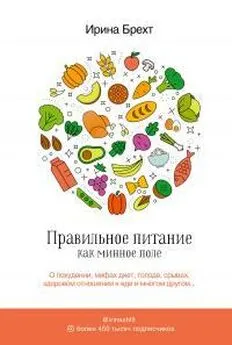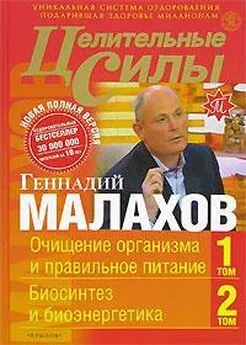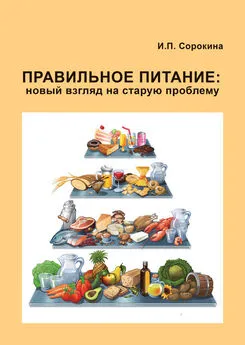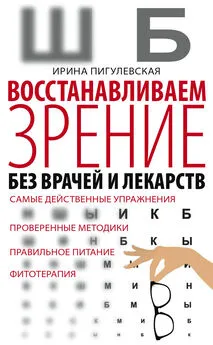Ирина Брехт - Правильное питание как минное поле
- Название:Правильное питание как минное поле
- Автор:
- Жанр:
- Издательство:ООО «ЛитРес», www.litres.ru
- Год:2019
- ISBN:нет данных
- Рейтинг:
- Избранное:Добавить в избранное
-
Отзывы:
-
Ваша оценка:
Ирина Брехт - Правильное питание как минное поле краткое содержание
Правильное питание как минное поле - читать онлайн бесплатно ознакомительный отрывок
Интервал:
Закладка:
7. Rolls BJ, Rowe EA, Rolls ET, Kingston B, Megson A, Gunary R. Variety in a meal enhances food intake in man. Physiol Behav. 1981 Feb;26(2):215—21
8. Leaf A and Antonio J. The Effects of Overfeeding on Body Composition: The Role of Macronutrient Composition – A Narrative Review. International Journal of Exercise Science: 2017 Vol. 10: Iss. 8, Pages 1275–1296.
Часть 4. Глава 24.
1. Onufrak S et al. E16—03 – Foods and Beverages Obtained at Worksites in the United States. Community and Public Health Nutrition (2018)
Часть 5. Глава 25.
1. Moehlecke M, Canani LH, Silva LO, Trindade MR, Friedman R, Leita˜o CB. Determinants of body weight regulation in humans. Arch Endocrinol Metab. 2016 Apr; 60(2): 152–162.
2. Doucet E, St-Pierre S, Almeras N, Despres JP, Bouchard C, Tremblay A: Evidence for the existence of adaptive thermogenesis during weight loss. Br J Nutr. 2001, 85: 715–723. 10.1079/BJN2001348.
3. Maestu J, Eliakim A, Jurimae J, Valter I, Jurimae T: Anabolic and catabolic hormones and energy balance of the male bodybuilders during the preparation for the competition. J Strength Cond Res. 2010, 24: 1074–1081. 10.1519/JSC.0b013e3181cb6fd3.
4. Maestu J, Jurimae J, Valter I, Jurimae T: Increases in ghrelin and decreases in leptin without altering adiponectin during extreme weight loss in male competitive bodybuilders. Metabolism. 2008, 57: 221–225. 10.1016/j.metabol.2007.09.004.
5. Eric T Trexler, Abbie E Smith-Ryan, Layne E Norton. Metabolic adaptation to weight loss: implications for the athlete. J Int Soc Sports Nutr. 2014; 11: 7.
6. Maclean PS, Bergouignan A, Cornier MA, Jackman MR: Biology’s response to dieting: the impetus for weight regain. Am J Physiol Regul Integr Comp Physiol. 2011, 301: R581-R600. 10.1152/ajpregu.00755.2010.
7. Paul S. MacLean, Audrey Bergouignan, Marc-Andre Cornier, Matthew R. Jackman. Biology’s response to dieting: the impetus for weight regain. Am J Physiol Regul Integr Comp Physiol. 2011 Sep; 301(3): R581—R600.
8. Sílvia Ribeiro Coutinho et al. The impact of rate of weight loss on body composition and compensatory mechanisms during weight reduction: A randomized control trial. Clinical Nutrition and Metabolism. Doi 10.1016/j.clnu.2017.04.008.
9. Polidori D, Sanghvi A, Seeley RJ, Hall KD. How Strongly Does Appetite Counter Weight Loss? Quantification of the Feedback Control of Human Energy Intake. Obesity (Silver Spring). 2016 Nov; 24(11): 2289–2295.
10. Marciani L et al. Effect of meal viscosity and nutrients on satiety, intragastric dilution, and emptying assessed by MRI. Am J Physiol Gastrointest Liver Physiol. 2001 Jun; 280(6):G1227—33.
11. Hoad CL et al. In vivo imaging of intragastric gelation and its effect on satiety in humans. J Nutr. 2004 Sep; 134(9):2293—300.
12. Hellstrо#m PM, Na#slund E. Interactions between gastric emptying and satiety, with special reference to glucagon-like peptide-1. Physiol Behav. 2001 Nov-Dec; 74(4–5):735—41.
13. Clegg M, Shafat A Conference on «Multidisciplinary approaches to nutritional problems». Postgraduate Symposium. The role of fat in gastric emptying and satiety: acute and chronic effects. Proc Nutr Soc. 2009 Feb; 68(1):89–97.
14. Burton-Freeman B. Dietary fiber and energy regulation. Journal of Nutrition. 2000;130:272S—275S.
15. Papathanasopoulos A., Camilleri M. Dietary fiber supplements: Effects in obesity and metabolic syndrome and relationship to gastrointestinal functions. Gastroenterology. 2010;210:65–72.
16. Slavin J., Green H. Dietary fibre and satiety. Nutrition Bulletin. 2007;32:32–42.
17. Westerterp-Plantenga M. S. Protein intake and energy balance. Regulatory Peptides. 2008;149:67–69.
18. Paddon-Jones D., Westman E., Mattes R. D., Wolfe R. R., Astrup A., Westerterp-Plantenga M. Protein, weight management, and satiety. American Journal of Clinical Nutrition. 2008;87:1558S—1561S.
19. Rolls BJ, Bell EA, Thorwart ML. Water incorporated into a food but not served with a food decreases energy intake in lean women. Am J Clin Nutr. 1999 Oct; 70(4):448—55.
20. Camire M. E., Blackmore M. Breakfast foods and satiety. Food Technology. 2007;61:24–30.
21. De Graaf C. Sensory responses, food intake and obesity. In: Mela D. J., editor. Food, Diet and Obesity. Abington, UK: Woodhead Publishing Limited; 2005. pp. 137–159.
22. Pal S, Radavelli-Bagatini S, Hagger M, Ellis V. Comparative effects of whey and casein proteins on satiety in overweight and obese individuals: a randomized controlled trial. Eur J Clin Nutr. 2014 Sep; 68(9): 980–986.
23. Abou-Samra R, Keersmaekers L, Brienza D, Mukherjee R, Macé K. Effect of different protein sources on satiation and short-term satiety when consumed as a starter. Nutr J. 2011 Dec 23; 10:139.
24. Martins C, Morgan L, Truby H. A review of the effects of exercise on appetite regulation: an obesity perspective. Int J Obes (Lond). 2008 Sep; 32(9): 1337–1347.
25. Blundell JE, Gibbons C, Caudwell P, Finlayson G, Hopkins M. Appetite control and energy balance: impact of exercise. Obes Rev. 2015 Feb;16 Suppl 1:67–76. doi: 10.1111/obr.12257.
26. Valéria Leme Gonc)alves Panissa et al. Effect of exercise intensity and mode on acute appetite control in men and women. Applied Physiology, Nutrition, and Metabolism, 2016, 41(10): 1083–1091.
27. Heden TD, Liu Y, Kanaley JA. Impact of Exercise Timing on Appetite Regulation in Individuals with Type 2 Diabetes. Medicine and science in sports and exercise. 2016;48(2):182–189. doi:10.1249/MSS.0000000000000755.
28. King NA, Burley VJ, Blundell JE. Exercise-induced suppression of appetite: effects on food intake and implications for energy balance. Eur J Clin Nutr. 1994 Oct; 48(10): 715—724
29. Leidy HJ, Bossingham MJ, Mattes RD, Campbell WW. Increased dietary protein consumed at breakfast leads to an initial and sustained feeling of fullness during energy restriction compared to other meal times. Br J Nutr. 2009 Mar;101(6):798–803.
30. Gavrieli A et al. Effect of different amounts of coffee on dietary intake and appetite of normal-weight and overweight/obese individuals. Obesity (Silver Spring). 2013 Jun;21(6):1127—32. doi: 10.1002/oby.20190. Epub 2013 May 13.
31. Rosenbaum M et al. Low dose leptin administration reverses effects of sustained weight-reduction on energy expenditure and circulating concentrations of thyroid hormones. J Clin Endocrinol Metab. 2002 May;87(5):2391—4.
Часть 5. Глава 26.
1. Wise RA. Dopamine, learning and motivation. Nat Rev Neurosci. 2004 Jun;5(6):483—94.
2. Sclafani A. Oral and postoral determinants of food reward. Physiol Behav. 2004 Jul;81(5):773—9.
3. Kern DL et al. The postingestive consequences of fat condition preferences for flavors associated with high dietary fat. Physiol Behav. 1993 Jul;54(1):71—6.
4. Johnson SL, McPhee L, Birch LL. Conditioned preferences: young children prefer flavors associated with high dietary fat. Physiol Behav. 1991 Dec;50(6):1245—51.
5. Drewnowski, A, Krahn, DD, Demitrack, MA, Nairn, K & Gosnell, BA (1992) Taste responses and preferences for sweet high-fat foods: evidence for opioid involvement. Physiol Behav 51, 371–379.
6. Guyenet SJ, Schwartz MW. Regulation of Food Intake, Energy Balance, and Body Fat Mass: Implications for the Pathogenesis and Treatment of Obesity. The Journal of Clinical Endocrinology and Metabolism. 2012;97(3):745–755. doi:10.1210/jc.2011–2525.
7. Monteleone P et al. Gastroenteric hormone responses to hedonic eating in healthy humans. Psychoneuroendocrinology. 38(8), 1435–1441, 2013
8. DiFeliceantonio et al., Supra-Additive Effects of Combining Fat and Carbohydrate on Food Reward. Cell Metab, 28:1—12, 2018
9. Olszewski PK, Levine AS. Central opioids and consumption of sweet tastants: when reward outweighs homeostasis. Physiol Behav. 2007 Aug 15;91(5):506—12. Epub 2007 Jan 30.
10. Zheng H et al. Peptides that regulate food intake: appetite-inducing accumbens manipulation activates hypothalamic orexin neurons and inhibits POMC neurons. Am J Physiol Regul Integr Comp Physiol. 2003 Jun;284(6):R1436—44. Epub 2003 Jan 23.
11. Cabanac M, Rabe EF. Influence of a monotonous food on body weight regulation in humans. Physiol Behav. 1976 Oct;17(4):675—8.
12. Levin BE, Dunn-Meynell AA.Defense of body weight depends on dietary composition and palatability in rats with diet-induced obesity. Am J Physiol Regul Integr Comp Physiol. 2002 Jan;282(1):R46—54.
13. Forman EM et.al. Ecological Momentary Assessment of Dietary Lapses Across Behavioral Weight Loss Treatment: Characteristics, Predictors, and Relationships with Weight Change.Ann Behav Med. 2017 Mar 9. doi: 10.1007/s12160—017—9897-x.
14. Polivy J. What’s that you’re eating? Social comparison and eating behavior. Journal of Eating Disorders. 2017;5:18. doi:10.1186/s40337—017—0148—0.
15. Polivy J, Herman CP. An evolutionary perspective on dieting. Appetite. 2006 Jul;47(1):30—5. Epub 2006 Jun 27.
16. Polivy J. Psychological consequences of food restriction. J Am Diet Assoc. 1996 Jun;96(6):589—92; quiz 593—4.
17. Polivy, J., & Herman, C. P. (1985). Dieting and binging: A causal analysis. American Psychologist, 40(2), 193–201.doi.org/10.1037/0003—066X.40.2.193
18. Claire E. Adams, Mark R. Leary. Promoting self – compassionate attitudes toward eating among restrictive and gilty eaters. Journal of Social and Clinical Psychology, Vol. 26, No. 10, 2007, pp. 1120—1144
19. Herman, C. P., Mack, D. Restrained and unrestrained eating. Journal of Personality (1975)43, 647–660.
20. Knight LJ, Boland FJ. Restrained eating: An experimental disentanglement of the disinhibiting variables of perceived calories and food type. Journal of Abnormal Psychology, 98, 412—420
21. Spencer JA, Fremouw WJ. Binge eating as a function of restraint and weight classification. Journal of Abnormal Psychology (1979), 88, 262—267
22. Heatherton TF, Baumeister RG. Binge eating as escape from self – awareness (1991). Psychological Bulletin, 110, 86—108.
23. Heatherton TF, Herman CP, Polivy J. Effects of physical threat and ego threat on eating behavior. Journal of Personality and Social Psychology (1991), 60, 138–143.
24. Heatherton TF et al. Self – awareness, task failure, and disinhibition: How attentional focus affects eating. Journal of Personality (1993) 61, 49–61.
25. Heatherton TF. Body dissatisfaction, self – focus, and dieting status among women. Psychology of Addictive Behaviors, (1993) 7, 225–231.
26. Jackson B et al. Motivations to eat: Scale development and validation. Journal of Research in Personality (2003) 37, 297—318
27. Herman CP, Polivy J. The self – regulation of eating: Theoretical and practical problems. In R. F. Baumeister & K. D. Vohs (Eds.), 2004. Handbook of self – regulation: Research, theory, and applications (pp. 492–508). New York: Guilford.
28. Muraven M. et al. One too many: Predicting future alcohol consumption following heavy drinking. Experimental and Clinical Psychopharmacology (2005), 13, 127–136.
29. Muraven M. et al. The morning after: Limit violations and the self – regulation of alcohol consumption. Psychology of Addictive Behaviors (2005), 19, 253—262
30. Westenhoefer J, Stunkard AJ, Pudel V. Validation of the flexible and rigid control dimensions of dietary restraint. International Journal of Eating Disorders (1999), 26,53–64.
31. Polivy J, Heatherton TF, Herman CP. Self – esteem, restraint, and eating behavior. Journal of Abnormal Psychology (1988), 97, 354–356.
32. Neff K. Self – compassion: An alternative conceptualization of a healthy attitude toward oneself. Self and Identity (2003), 2, 85—101
Читать дальшеИнтервал:
Закладка:








![Артем Каменистый - Правильное питание [СИ]](/books/1146496/artem-kamenistyj-pravilnoe-pitanie-si.webp)

